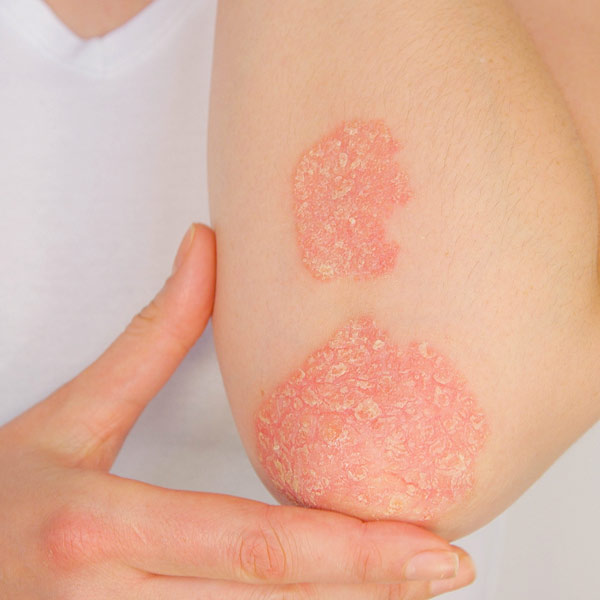August is Psoriasis Awareness Month

Every month is dedicated to raising awareness about different health conditions. For the month of August, we are ask to bring our awareness to a condition called Psoriasis. Within this blog we are going to do just that. We will discuss what this condition is, who it affects, how to know if you or someone you know suffers from it, what to do if you have this condition, and more. This blog may not apply to you, however, take it as an opportunity to learn something new and raise your education levels to conditions that affect our population. “One can never know too much.”
To begin with, we must first understand what exactly Psoriasis is. Psoriasis is a disease that is believe to be caused by a malfunction of the immune system. It is thought to be where the body regenerates its skin faster than normal, ultimately causing dead skin cells to build up on the body’s surface. When this occurs the body appears to form thick, red, itchy patches on the surface of the skin making the symptoms of Psoriasis easy to identify. In children, you may also see small white scales or spots. These patches can be itchy, sore, or have a burning sensation. Psoriasis can also lead to stiff and swollen joints and can affect the fingernails causing thickened, pitted or ridged nails. Psoriasis can be found anywhere on the body but most commonly is discovered on the knees, elbows, torso, and/or scalp.
Now who is affected by Psoriasis? Psoriasis can affect anyone at any age, however, it primarily first discovered between the ages of 15-25. Men, women, children, can all be affected; much like all races can be affected. There is not too much of a difference between age, race, and gender within who is impacted. The condition relies on other risk factors that the individual might have.
What are the risk factors of Psoriasis? Psoriasis is commonly passed down through family members. If one of your parents suffers from the condition your chances are increased, if both parents suffer then your chances are further increased. In addition to genetics, we said that Psoriasis is caused by the body’s immune system, therefore stress may cause or increase one’s Psoriasis. Stress lowers the body’s ability to fight off diseases, therefore giving yourself a higher chance of developing conditions like Psoriasis.
Other triggers to Psoriasis include: infections such as strep throat or skin infections; cold or dry weather; any injuries to the skin like sunburn, cuts or a bug bite; heavy alcohol use, smoking or exposure to second hand smoke, and certain medications like lithium, high blood pressure medicine and antimalarial drugs. In order to know your chances of developing Psoriasis, talk to your family about past medical conditions and take the time to examine your own lifestyle choices. This small act can be the reason you save your health. Psoriasis can be a constant condition or it can come in waves. Some people experience the condition in monthly or weekly cycles. One’s symptoms can be different from another, the most important thing is to listen to your body and know when something does not feel right.
How do you treat Psoriasis? A common misconception about this condition is that it is contagious, when in fact it is not. Psoriasis is an immune disorder that is passed on through genetics and stress. Flare-ups are brought on by the triggers mentioned above. Unfortunately, Psoriasis is a chronic condition that does not have a cure, however, there are ways to relieve one’s symptoms. Most commonly your doctor will prescribe topical creams to relieve the itching, burning, etc. There are also light therapy treatments as well as injectable or oral medications that one can be prescribed. While all of these treatment options are available, none of them will actually cure the condition, it’ll only help manage one’s symptoms. Aside from medications and light therapies, there are holistic remedies to try at home: moisturizing daily, adding oil or oatmeal to your daily bathes, reducing your sun exposure, wearing sunscreen, managing stress, and most importantly knowing your triggers. One’s condition can be triggered differently from another; therefore, it is best to understand what sparks your Psoriasis and try your best to avoid it. Prevention is truly the best medicine. Understanding your condition, along with your body, will help you be able to manage and treat your condition.
It is important to be in touch with your health care providers in order to remain on top of your health. Know your family health history. If you think that you have Psoriasis, don’t hesitate to talk to your doctor for clarification and how to deal with your symptoms. In addition, if you do have the condition and you find your symptoms worsening, talk to your doctor about changing your treatment plan, every body is different and it must be treated accordingly.
If you or someone that you know suffers from Psoriasis, take this month as an opportunity to educate and share stories about the condition and make it known to others that your conditions do not define who you are!
